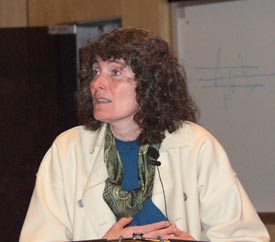Michael Ravitch Lecture Series Takes Off
 When long-time Northwestern medical educator Michael M. Ravitch, PhD, suffered a stroke in 1997, he was catapulted into the world of the disabled. Upon his death in 2004, his family and friends established a lecture series in his memory to recognize three things: His many contributions to medical education—he was the developer of the problem-based learning component that still serves as the foundation of the Feinberg School of Medicine curriculum; his devotion to his students; and his appreciation of the role that rehabilitation professionals played in his life after the onset of his disability.
When long-time Northwestern medical educator Michael M. Ravitch, PhD, suffered a stroke in 1997, he was catapulted into the world of the disabled. Upon his death in 2004, his family and friends established a lecture series in his memory to recognize three things: His many contributions to medical education—he was the developer of the problem-based learning component that still serves as the foundation of the Feinberg School of Medicine curriculum; his devotion to his students; and his appreciation of the role that rehabilitation professionals played in his life after the onset of his disability.
So it seemed fitting that the inaugural lecturer for the Michael M. Ravitch, PhD, Memorial Lectureship be committed to medicine as well as the needs of the disabled. Harvard Medical School Professor Lisa I. Iezzoni, MD, MSc (pictured right), spoke to third-year medical students and friends and family of Dr. Ravitch gathered April 14 in the Hughes Auditorium. Having been diagnosed with multiple sclerosis nearly 30 years ago while still a medical student and now using a motorized scooter, Dr. Iezzoni gave a wake-up call to medical students in her presentation, “Make No Assumptions,” urging them to abandon their preconceived notions and see their disabled patients as collaborative partners and experts in their own needs, abilities, preferences, and expectations.
She reminded the group that most people will experience a disability, if only for a short time, later in life. Furthermore most physicians, regardless of their specialty, will encounter patients with disabilities. “Disability is the one minority group that anyone can join in a flash,” she said.
Dr. Iezzoni, professor of medicine at Harvard and co-director of research in the Division of General Medicine and Primary Care at Beth Israel Deaconess Medical Center in Boston, noted that open communication between patient and physician about a disability is critical. Physicians need to understand, and even better, respect and value patients’ needs and expectations, she said.
“People with disabilities often have other people describe their lives for them—circumscribe their lives for them—but they are the experts about their lives,” she said.
When people with disabilities go to their physicians for routine procedures or help with secondary ailments produced by their disabilities, the disability often becomes the elephant in the room. Studies have shown that women who have difficulty walking are 70 percent less likely to be asked about contraception by their physicians than other women. She attributed that to the stereotype that people who use wheelchairs or who have trouble walking are not sexually active.
Dr. Iezzoni pointed out that unlike those around them, people with disabilities do not always see themselves as being at a disadvantage. If someone becomes a paraplegic at age 40, she explained, they still have another 30 plus years to live. They may view their disability as just something that happened to them. They still fulfill roles such as parents, workers, or spouses.
“They will need medical care for all of that, as well as health and wellness,” she said. “Disability doesn’t equal illness.”
In closing, Dr. Iezzoni gave the medical students a word of advice: “Don’t ever be embarrassed to talk about disability [with your patients] because you are afraid you’ll use the wrong words, you’ll embarrass yourself, or you’ll say something that is really boneheaded.” People who are living with disabilities have heard it all and will appreciate your effort, she added.






